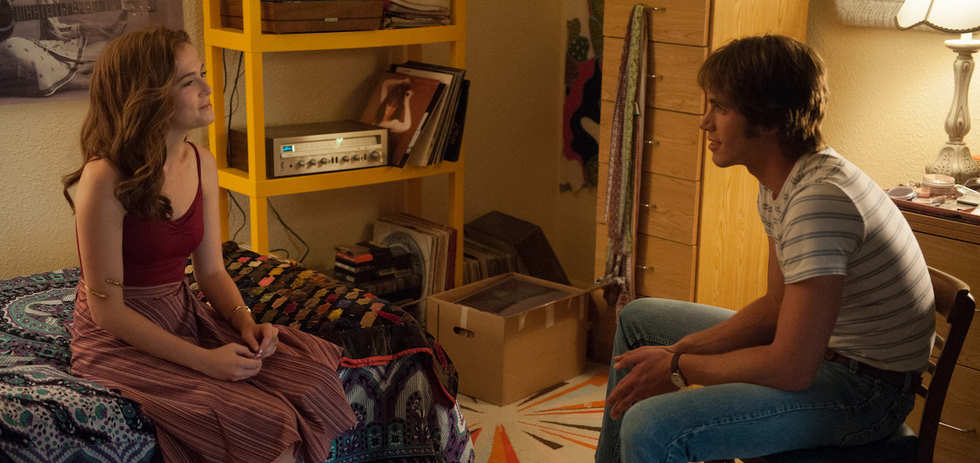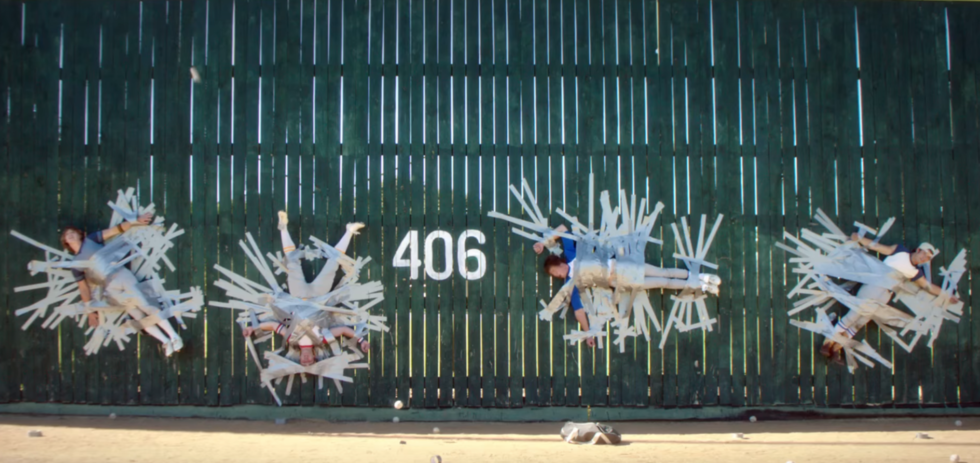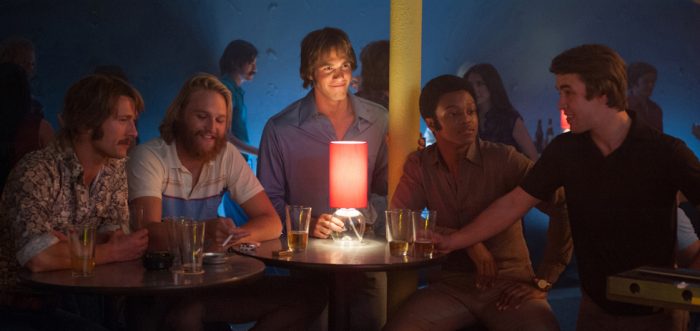
Because it’s easy, some people like to divide Richard Linklater’s films into two well-defined categories: on the one hand, the rich variations on his philosophy of memory and time (Slacker, Waking Life, the Before series, Boyhood), on the other, surprising curios with few binding similarities made in the intervals between passion projects (Bernie, Me and Orson Welles, School of Rock, Bad News Bears). There are two films that disturb this simplistic binary, both nostalgia-steeped reveries buoyant enough to warrant inclusion in the latter category, but entrenched too deeply in Linklater’s fond memories of youth to be denied inclusion in the former. Dazed and Confused—which, full disclosure, I’ve seen upwards of fifty times—follows star quarterback and Linklater avatar Randall ‘Pink’ Floyd through his last day of school before senior year in a small Texan town in America’s bicentennial year, slacking, drifting and partying as he mingles through a generous cross-section of the school community. The film’s central conflict is trifling: Pink is being forced by his coach to sign a contract promising not to indulge in any drugs or alcohol in the year ahead to ensure the football team a “champion season in ‘76”. Will the white jock concede his social liberties? Should we care? Somehow, we do.
Twenty-three years later, Linklater has returned to this recollected world of waylaid youth and endless summer for the second of these oeuvre-disrupting efforts. It’s a different time and place and sport—1980, college, baseball—and the characters are also brand new, but the two films are undeniably and inextricably linked. Aside from similar opening and closing shots, a plethora of binding references, a wall-to-wall soundtrack of period classics and the theme of sad endings and unsure new beginnings, they share specific DNA: a vast ensemble of richly-drawn characters who drift through lazy experiences that hang around like a cloud of pungent weed smoke in a shuttered dorm room, beckoning memories of good times, waiting to be revisited.
The new film’s sly, euphemistic title—Everybody Wants Some!!—shuns any deep contemplation with its cheery vigor, but it deserves more scrutiny than meets the eye. Borrowed from Van Halen, on the surface it’s a vague, apparently meaningless declarative; the linguistic equivalent of a clumsy fist-pump, complete with two youthful exclamation points. Look closer—as you always must with Richard Linklater—and it’s laden with implicit meanings. Once you’ve seen the film, you’ll know that the “some” that everybody supposedly wants(!!) refers in no uncertain terms to sex, specifically with women—“pussy”, “tail” or “poon tang” as its characters inelegantly phrase it throughout the film’s skip-along duration. In which case, the eponymous “everybody” refers only to a small subset of men whose inordinate privilege gives them the liberty to prioritise such bawdy concerns. It perfectly manifests their worldview and the tone of the film they’re in: baseball players—kings—blinkered to the realities outside of their nested position.

As with Dazed and a great many other movie-length hangouts, there’s little here in the way of plot. When Jake (Blake Jenner) arrives for his first weekend at college, there’s almost no instruction. Be at baseball practice, says team captain McReynolds (Tyler Hoechlin). Coach lays out two more rules, obviously made to be broken: no drinking in the house, no sex in the bedrooms upstairs. Otherwise, go nuts. There’s no big, earth-shaking philosophical gambit here—no twelve-years-in-the-making, and no long-awaited revisiting of characters after decade-long intervals—a lack which doesn’t blunt Everybody Wants Some!!’s subtle impact. The structural conceit is near-invisible: over three days and fifteen minutes (the time remaining before class begins), Jake and his teammates hang out and party, superficially switching between styles and interchangeable identities like records in a jukebox. They trade arrow-collared shirts and flares at the Sound Machine with cowboy hats and rodeo boots at a country hootenanny joint, before an unexpected reunion with ball-player-turned-punk Justin (Michael Monsour) lands them at an aggressive alt throwdown. Jake’s blossoming romance with performing arts major Beverly (Zoey Deutch) takes them to an overbearingly whimsical art party and out into the dawn, where half-drunk philosophical chit-chat lends Linklater’s film a moment of poignant clarity, Jake laying out his laidback life credo before class and college officially begin. As baseball players of primed body and able mind, they’re afforded the luxury of fitting in almost anywhere—this is college utopia, a cross-section of every kind of clique surveyed in two hours and from the vantage point of the guys on top of the food chain.
“Who are these people?”, asks Plummer (Temple Baker), the film’s resident dimwit, as the gang stroll past other campus houses packed with non-athletes, genuinely puzzled at what they do if they don’t play baseball. Existence without the comforts of sport and team camaraderie is unfathomable. But how many dweebs had to suffer, and how many women had to tolerate being constantly beleaguered by men who saw them as another notch on a belt, a tally to be bragged about, so that their stable role atop the social hierarchy was ensured? Everybody Wants Some!! is all smiles all the time, but the bitter reality is that it takes place in a time when the bad behaviour of good athletes was tolerated because the school’s reputation banked on their performance, which was in turn perceived as contingent on their comfort within the school’s social world. In today’s political climate, where activism against these patriarchal orthodoxies is overwhelmingly (and rightly) prominent, Everybody Wants Some!!’s valorisation of jocks and their obnoxiousness is a defiantly unattractive prospect. Add to this equation the fact that nostalgia is nowadays almost roundly repudiated. And yet…
…and yet Linklater succeeds, without so much as a hint of irony, in digging up wells of pleasure in watching this chronology of uncouth coquetry, bad behaviour and ass-patting sportsmanship unfold. It’s not a film you see once and remember fondly, but, like Dazed, a film to be watched over and over and over again, each revisitation a warm homecoming, a reunion with characters who feel like old friends even when they might be the antithesis of who we are as individual cinemagoers.
From the get-go, the travails of one-upmanship between these forced-together teammates are observed with anthropological precision. Almost every move they make is a display of animal dominance—ping pong, foosball, space invaders, drinking, smoking, picking up, and putting down become sports in their own right. Competitiveness is the glue that binds; the ineffable stuff that makes their team “the best”. Behind each of their comic microaggressions is the firm belief that as “baseball players”—a phrase uttered with reverence—they’re Herculean models of ideal masculinity. They’re almost always self-aggrandising, and with the exception of philosophical chatterbox Finnegan (Glen Powell), who seems to have more of a clue about reality than the others, they’re unknowingly cocksure beyond reprimand. On the rare occasion that they’re ceding their superiority, it’s strategic—Finn tells girls about his “average cock” (“I’m neither a grower or a shower”) to coax them into thinking he’s modest. Their grand romantic gestures seem momentarily genuine, but they’ll snigger once the girls have left the frame. Even more amusing is the precisely observed, borderline homoerotic male grooming rituals—butthugging, crotchgrabbing jeans, midriff-baring hockey jerseys and handlebar moustaches are rife, and the pungent smell of cheap cologne and hairspray even more so.

There have been other films at the Sydney Film Festival that tackle the theme of male competitiveness head-on, like Athina Rachel Tsangari’s Chevalier, which spins the idea into an allegorical satire set aboard a moored yacht.1 Many have praised that film over Linklater’s for its directness in repudiating absurd male social mores, but Linklater’s is, I think, the more nuanced take on the feature-length pissing contest. It’s at least refreshing to see a film that’s about something as topical as masculinity without feeling it also needs to explicitly name and critique that same problem, or to treat it as a problem at all. It’s frustrating but hardly surprising that we need to remind critics and audiences alike that depiction does not equal endorsement—that laughing at the foibles of naive characters who would normally be cast as antagonists and feeling affection for them are not mutually exclusive actions. That Linklater is able to keep his audience concurrently captivated and in a state of near-constant high-spirited merriment is laudable, and he does it with an elegance few could master.
Take the film’s best and funniest scene, which takes place in token stoner Willoughby’s room, where Jake, Dale (J. Quinton Johnson) and Plummer talk faux-profound guff, pass around a bong and listen to rock records. The conversation is barely illuminating—as written by Linklater and undoubtedly workshopped through rehearsal, it’s faultlessly nuanced college dude-speak. There’s an aborted attempt at telepathy (“Humans were telepathic, man; the Mayans knew it; the Druids freakin’ knew it, man”), a round of competitive cone-smoking, and a shared memory of an old Twilight Zone episode, the one where a supposedly ugly woman gets corrective surgery to make herself beautiful, only to discover she was the only beautiful person on earth all along. It’s called ‘Eye of the Beholder’. And then Willoughby talks about music. Pink Floyd’s ‘Fearless’ comes on the stereo, and he begins a freewheeling stream-of-consciousness about chord progressions that ends in a perfect coda: it’s not the notes that count, “but the space in-between the notes they’re offering you.”
Of course no one could surmise the magic of Linklater better than Linklater himself. Everybody Wants Some!! isn’t about college baseball, but in between the series of exquisitely realised moments that we’re offered there’s a generous, congenial study on the thrill of youth; how taken for granted that thrill is when we’re in the midst of it, and how glossed-over and romantic it all seems in retrospect. This is a riot of a movie, drenched in sunny naivete and paced at an open, lackadaisical beat; a pipe dream set back in the past—a pipe memory, perhaps—that ends without the resolution of conflict (because there isn’t any) and instead in the promise of endless fun. One day, Jake and his teammates will have to define ‘life’ outside of the strictures of baseball, but that existential crisis is delayed for at least a few years more. In the time that intervenes between now and then, Jake’s world, and the movie depicting it, is content to unfold in unadorned, unrestricted bliss. When the credits roll, so do the good times.
Around the Staff
| Lidiya Josifova | |
| Conor Bateman | |
| Jessica Ellicott | |
| Dominic Barlow | |
| Luke Goodsell | |
| Virat Nehru |
